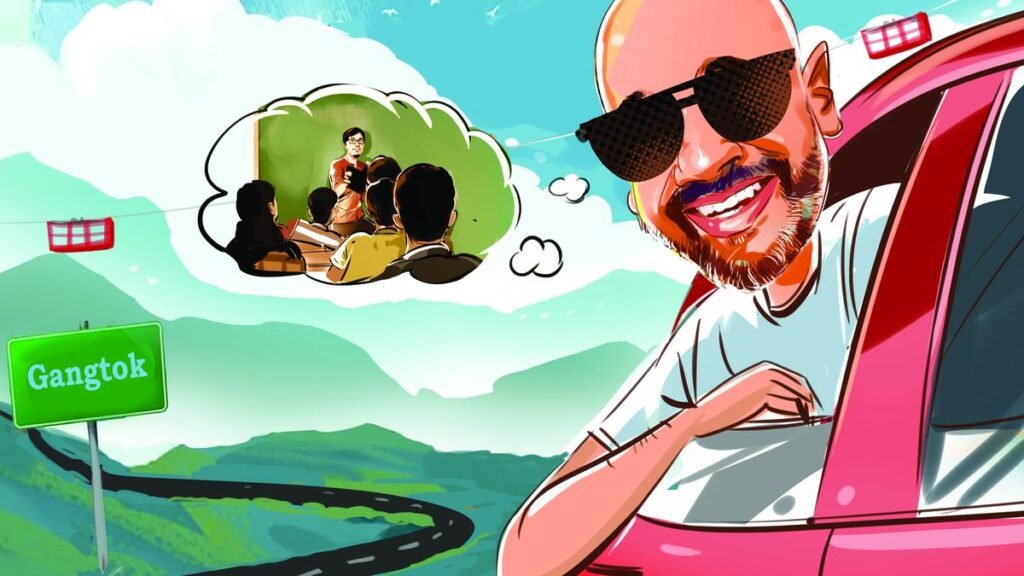The first term has just ended at Krea University. I am now in Gangtok, Sikkim, far removed from the cosmopolitanism of Sri City, because my parents refuse to visit me down South. I complain about the cold in September, which they think is a charming affectation. I am happy to be here, but I miss my purposeful life in rural Andhra Pradesh. It was an intense, rewarding twelve weeks.
The biggest culinary revelation of the last term came in the form of the Japanese establishments around town expanding their repertoire to include Korean cuisine. At some point this summer, Zen by Tokyo Ryokan, not my favourite Japanese place, incorporated dishes such as sundubu jjigae and jijampong bap. The chef continued experimenting, sometimes with bewildering results. Asagao, my preferred eatery, had sadly placed a hiatus on its Korean offerings. I was, of course, dying for the tea on that. Sri City living can make you curious about the inanest matter.
The manager at Asagao is a wonderful young man called Julius. Ever the consummate professional, he insists that we place our order at least an hour before we get to the restaurant. The karaage and tori teriyaki materialize within minutes of our sitting down. The turnaround, more Burger King than a place that could be accused of nursing fine-dining aspirations, feels equal parts incongruous and delightful.
Because my brain works in mysterious ways, I often refer to Julius as Caeser. He, too, answers to Caeser. It’s a beautiful relationship. Julius whispered to us this past weekend, in a tone both exasperated and conspiratorial, that the chef who had especially been hired to cook Korean fare absconded in the middle of the night. “We were paying him 35,000 rupees,” he said. Julius is a raconteur and a half. My students could learn a trick or two from him.
But they would have no time for Asagao or for Julius. They have had a superbly busy two months, you see.
At some point in the term, I casually mentioned to my Advanced Creative Writing Graham Greenes that we should celebrate the end of class with a showcase. They deserved it — they had been hard at work. It takes a sadist to assign not one but two stories — “fully realised,” I’d gesticulate, like I had invented the term — to be completed over ten short weeks. When I saw these sleep-deprived figures frantically type on their laptops, I often felt a pang of guilt. It was time to make reparations. The celebration would be a start. Propose a group reading to a bunch of writers who haven’t yet been tainted by adulthood or literature festivals, and you will be surprised at the wings the idea sprouts.
The excitement was immediate. Someone wanted a poster. “Dress code: semi-formal,” she insisted it must proclaim. The art would also incorporate a mention of comma splices because why the hell not? We deliberated the logistics of time and date and parents in the audience. We’d serve cupcakes and samosas. A short-lived rumour of hot chocolate did the rounds, too. A sexy new space, christened the Global Arts Studios, was the venue. There would even be a lectern. I was told to expect at least a 40-strong audience.
But the event needed a name. What would we call an end-of-term reading? We professors declared ourselves neologistically challenged. There would be a competition among the students. The winning name would bag a prize. Suggestions arrived hard and fast. “Commatose,” a trio wrote in. “The Write Voice,” said someone. “In Short” and “A Short Stop” were bandied around. “A Short Stop” abbreviated to ASS, which, of course, tickled this juvenile professor. Ultimately, “What We Wrote” won for its panache.
I have always had zero patience for book readings. I loathe attending them only slightly more than I loathe giving them. But what was not to love about the innocence of a dozen or so 20-year-olds organizing their own reading? Their nervousness was endearing. Seemingly shy writers metamorphosed into emotive powerhouses (in semi-formals) on the microphone. A couple of students were away for health reasons. Their friends read for them. A generous audience took videos, clapped and cheered. Tutors looked on proudly from the back. If book readings captured a quarter the warmth of “What we Wrote,” some of the issues plaguing modern-day publishing would be obliterated.
It was a fitting end to the term. Teaching does fulfil me in a way that writing does not, but that’s neither here nor there. For at least a few days now, I shall swap the idli for the momo and the sambar for the thenthuk. The Kanchendzonga has still not deigned to make an appearance in Gangtok, thanks to the rains. Some weeks after I return to Krea, the winter monsoons will commence. It is my favourite time to be in Sri City. The rains pattering on the roof should provide the perfect soundtrack for yet another student-led reading. Perhaps we could even get gyozas from Asagao for snacks.
Prajwal Parajuly is a novelist. Karma and Lola, his new book, is forthcoming in 2026. He teaches Creative Writing at Krea University and oscillates between New York City and Sri City.
Published – September 17, 2025 03:55 pm IST

